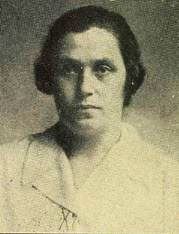Berta Pīpiņa facts for kids
Quick facts for kids
Berta Pīpiņa
|
|
|---|---|

1929
|
|
| Born | 28 September 1883 Code parish, Russian Empire
|
| Died | 1942 (aged 58–59) |
| Nationality | Latvian |
| Other names | Berta Ziemele, Berta Pipinya |
| Occupation | politician |
| Years active | 1901–1940 |
| Known for | first woman parliamentarian of Latvia |
Berta Pīpiņa (born Berta Ziemele; 28 September 1883 – 1942) was an important Latvian woman. She was a teacher, journalist, politician, and a strong supporter of women's rights. Berta Pīpiņa made history as the first woman elected to the Saeima, which is Latvia's parliament. She worked hard to create laws that would help women and families. When Soviet troops took over Latvia, she was sent away to Siberia and died in a labor camp. For a long time, her story was hidden, but now we remember her important work.
Contents
Early Life and Education
Berta Ziemele was born on 28 September 1883. Her family lived in a place called Code parish in what was then the Russian Empire. Today, this area is part of Latvia. Her parents worked on a farm and also ran a small inn.
Berta went to school at the Girls' Grammar School. Later, she attended the Beķeris Girls’ Preliminary Gymnasium in Bauska. This school gave young women four years of secondary education.
Career and Activism
Becoming a Teacher and Learning More
In 1901, Berta Ziemele started her career as a teacher in Kharkiv, which is now in Ukraine. She was very dedicated to helping children. From 1904 to 1908, she went to Berlin to study speech therapy. She learned special techniques to help children with disabilities.
After that, she traveled to Switzerland and Russia. She wanted to learn more about different education systems. In 1910, Berta returned to Latvia. She married Ermanis Pīpiņš, who was a journalist and writer. They had three children together: two daughters named Biruta and Nora, and a son named Jānis.
Working for Women's Rights
Latvia became an independent country in 1918. Berta Pīpiņa then became very active in social and political issues. She helped start the Democratic Center Party. She was the first woman to be elected to a political party's main committee.
In 1919, she was elected to the Riga City Council. Here, she worked on important topics like public safety and issues affecting women and children. She also gave many speeches about women's rights.
Around 1922, Berta joined the Latvian Women’s National League. This group helped women and families. In 1925, Berta Pīpiņa became the president of this League. The League did many good things, like starting a kindergarten, running a library, and offering free legal advice to women. Berta believed it was important to unite women and help them become strong leaders for future generations.
First Woman in Parliament
From 1925 to 1928, Berta Pīpiņa led the Riga Department for the Destitute, which helped people in need. She also worked on the Riga Audit Commission, checking how city offices were run. In 1928, she started publishing her writings.
In 1930, she helped create the Council of Latvian Women’s Organizations. This was a big group that brought many women's organizations together. Its goal was to improve social and political equality for women. Berta became the leader of this council.
In 1931, Berta Pīpiņa made history again. She became the first woman to serve in the Saeima, Latvia's parliament. She was the only female member among 100 parliamentarians during this time. She worked hard to create laws that would protect women and families. For example, she spoke out against a law that would force married women to quit their jobs. She also pushed for laws to help families and the poor, even though some male colleagues and the press made fun of her ideas.
International Work and Later Years
Berta Pīpiņa also took part in many international women's conferences. She attended meetings in places like Vienna, Stockholm, Paris, and Dubrovnik. In 1934, she helped start a monthly magazine called Latviete (Latvian woman). This magazine aimed to educate women and fight against old ideas that stopped women from being treated equally.
In 1934, she left her work with the Riga City Council. In 1935, she stepped down from leading the Council of Latvian Women’s Organizations. She also wrote a novel called Lejaskrodzinieka meita (Innkeeper's daughter) in 1935. In 1936, she became a vice president of the International Council of Women.
When a new, stricter government came to power in Latvia in 1934, Berta Pīpiņa continued to work as a journalist but stopped being active in politics.
Death and Legacy
In 1940, Soviet troops took over Latvia. Berta Pīpiņa was seen as an enemy because she had served in Latvia's independent parliament. In 1941, she was sent away to Siberia. She died in a labor camp near the Ob River in 1942.
During the time Latvia was under Soviet control, her story was removed from books and encyclopedias. But after Latvia became independent again, people remembered her important role in politics and the women's movement. Today, Berta Pīpiņa is recognized as a brave and pioneering woman who fought for equality and justice.

